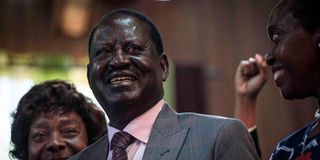Raila promises ‘free education’, vows to hire 300,000 teachers

Mr Raila Odinga and Martha Karua.
Azimio la Umoja One Kenya coalition flagbearer Raila Odinga will have to increase the education budget by close to Sh200 billion to fulfil his pledge of transforming learning, if elected on August 9.
Under the ‘Citizen Education’ pillar, Mr Odinga has promised several goodies, including free education from kindergarten to university and the employment of over 300,000 teachers. He would, however, have to raise spending on the sector from Sh544.4 billion to Sh744.4 billion.
The Teachers Service Commission (TSC), which takes the bulk of the budgetary allocation, would once more raise spending by Sh150 billion. In the 2022/2023 proposals, TSC has been allocated Sh298.4 billion, which is up from the Sh281.7 billion it received last year.
To hire the 300,000 teachers, Mr Odinga will require at least Sh150 billion. The government has been spending Sh2.5 billion annually over the last five years to recruit teachers to plug a biting shortage. Sh1.2 billion has been proposed in the budget to recruit 6,000 interns as a stop-gap measure.
The proposal to absorb all the unemployed teachers could, however, lead to over-staffing in public schools as they have a shortage of 114,581. The Azimio Point Number 8, ‘Waste not a Single Child’, proclaims that education is non-negotiable.
“This programme will be an aggressive scheme to ensure that all, not some of our children, get rightful access to quality education. We will deploy motivated teachers to deliver quality education to our children, so that there is no child left behind. We shall employ all the qualified teachers who are currently unemployed,” states the manifesto.
Vocational education and training
Apart from teacher recruitment, Mr Odinga has promised that his government will offer ‘free’ education from pre-primary, primary, secondary to university level. In addition, he promises to increase investment in technical and vocational education and training (Tvet) “to support manufacturing”.
The government has planned to spend Sh12 billion in the next financial year to fund the Free Primary Education (FPE) programme whose capitation has remained stuck at Sh1,420 per child since it was established by the Kibaki administration in 2003.
The Free Day Secondary Education (FDSE) has been allocated Sh64.4 billion at a capitation rate of Sh22,240 per student annually.
In promising ‘free’ university and tertiary education, Mr Odinga’s manifesto fails to explain what this entails. Currently, students under government sponsorship benefit from an 80 per cent capitation of their tuition fees and only pay Sh16,000 annually, which university managements complain is not in tandem with present economic realities.
Paying all the tuition fees for the 562,000 students in the universities would raise the expenditure from the current Sh91.2 billion. It would cost the Azimio government about Sh9 billion to pay all the tuition fees.
Capitation for Tvet students cost the government Sh5.2 billion and this would also go up if the government was to take care of everything. The bulk of the 826,807 candidates who sat the 2021 KCSE exams will end up in Tvet since only 144,466 qualified for university admission under government sponsorship.
Mr Odinga has also pledged to “provide one nutritionally balanced free meal per child attending ECDE and lower primary”. There are about seven million children in this category.
Catering for all of them would almost triple the budget to Sh5.88 billion.
Currently, the government spends Sh1.96 million on school feeding programme but only for 2.5 million children in arid and semi-areas areas and urban informal settlements.
Apart from these expenditures, schools countrywide require huge investments in infrastructure, especially with the roll-out of junior secondary school in January next year.





